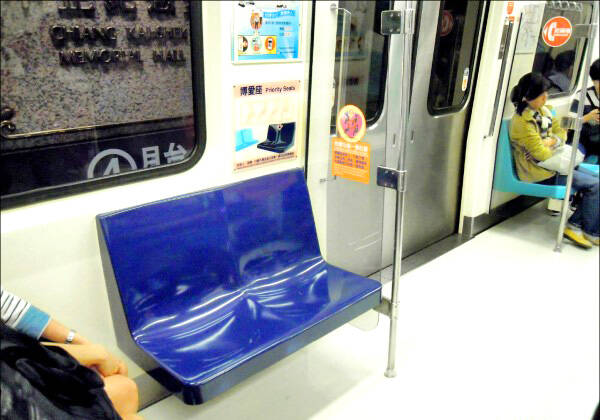A draft amendment that would allow priority seats on public transportation to be given to “people with actual need” instead of only elderly people, women and children passed a legislative committee on Thursday.
The legislature’s Social Welfare and Environmental Hygiene Committee passed the draft amendment proposed by the Executive Yuan to the People With Disabilities Rights Protection Act (身心障礙者權益保障法).
The amended version removes the words “elderly, women and children” to allow “people with actual need” to use priority seats, said Chien Hui-chuan (簡慧娟), director of the Ministry of Health and Welfare’s Social and Family Affairs Administration.

Photo: Chien Li-chung, Taipei Times
A similar proposal has also been put forward by Democratic Progressive Party legislators Wu Yu-chin (吳玉琴), Lin Yi-chin (林宜瑾) and Chen Ming-wen (陳明文) along with Chinese Nationalist Party (KMT) Legislator Chang Yu-mei (張育美).
Article 58, Paragraph 2 of the act stipulates that people with disabilities and one of their necessary companions may also use priority seats.
The committee agreed to remove the word “may” from the paragraph following a suggestion by Wu.
Wu and others also proposed a draft that would require city and county governments to integrate local transportation methods, including taxis, Rehabus — a government-sponsored bus service for transporting people with disabilities — and other accessible transportation services to meet the needs of disabled people.
Local governments have made efforts to provide more convenient transportation services to people with disabilities, but the proposal was made as there is room for improvement, Chien said.
The proposal was passed by the committee.
Article 59 of the act stipulates that people with disabilities may be exempted from admittance fees when entering public scenic areas, entertainment venues, or cultural and educational areas, and would only pay half the price at private ones.
Wu proposed to include sports and exercise facilities to the article.
Chien said that public sports venues already provide discounts to disabled people, but the government has to further deliberate on discounts at private sports and exercise facilities, as it might affect the spending of local governments and businesses.
The Ministry of Education’s Department of Student Affairs and Special Education officer Chen Tien-ting (陳添丁) said his ministry welcomes the proposal, as it encourages people with disabilities to participate in social events.
However, more assessments are needed before amendments can be made to order private venues to offer discounts to disabled people, he said.
Wu agreed to turn the proposal into an attached resolution that encourages private businesses to support people with disabilities to participate in sports.

‘DENIAL DEFENSE’: The US would increase its military presence with uncrewed ships, and submarines, while boosting defense in the Indo-Pacific, a Pete Hegseth memo said The US is reorienting its military strategy to focus primarily on deterring a potential Chinese invasion of Taiwan, a memo signed by US Secretary of Defense Pete Hegseth showed. The memo also called on Taiwan to increase its defense spending. The document, known as the “Interim National Defense Strategic Guidance,” was distributed this month and detailed the national defense plans of US President Donald Trump’s administration, an article in the Washington Post said on Saturday. It outlines how the US can prepare for a potential war with China and defend itself from threats in the “near abroad,” including Greenland and the Panama

The Chinese Nationalist Party (KMT) is maintaining close ties with Beijing, the Democratic Progressive Party (DPP) said yesterday, hours after a new round of Chinese military drills in the Taiwan Strait began. Political parties in a democracy have a responsibility to be loyal to the nation and defend its sovereignty, DPP spokesman Justin Wu (吳崢) told a news conference in Taipei. His comments came hours after Beijing announced via Chinese state media that the Chinese People’s Liberation Army’s Eastern Theater Command was holding large-scale drills simulating a multi-pronged attack on Taiwan. Contrary to the KMT’s claims that it is staunchly anti-communist, KMT Deputy

RESPONSE: The government would investigate incidents of Taiwanese entertainers in China promoting CCP propaganda online in contravention of the law, the source said Taiwanese entertainers living in China who are found to have contravened cross-strait regulations or collaborated with the Chinese Communist Party (CCP) could be subject to fines, a source said on Sunday. Several Taiwanese entertainers have posted on the social media platform Sina Weibo saying that Taiwan “must be returned” to China, and sharing news articles from Chinese state media. In response, the Mainland Affairs Council (MAC) has asked the Ministry of Culture to investigate whether the entertainers had contravened any laws, and asked for them to be questioned upon their return to Taiwan, an official familiar with the matter said. To curb repeated

Myanmar has turned down an offer of assistance from Taiwanese search-and-rescue teams after a magnitude 7.7 earthquake struck the nation on Friday last week, saying other international aid is sufficient, the National Fire Agency said yesterday. More than 1,700 have been killed and 3,400 injured in the quake that struck near the central Myanmar city of Mandalay early on Friday afternoon, followed minutes later by a magnitude 6.7 aftershock. Worldwide, 13 international search-and-rescue teams have been deployed, with another 13 teams mobilizing, the agency said. Taiwan’s search-and-rescue teams were on standby, but have since been told to stand down, as